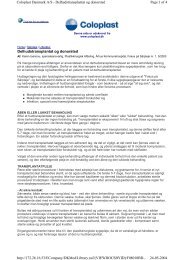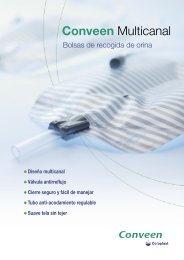Managing children with stomas - Coloplast
Managing children with stomas - Coloplast
Managing children with stomas - Coloplast
You also want an ePaper? Increase the reach of your titles
YUMPU automatically turns print PDFs into web optimized ePapers that Google loves.
Practical care<br />
How to manage at home<br />
All <strong>children</strong> and families manage living <strong>with</strong> a stoma<br />
slightly differently and adapt their lives in different ways.<br />
Having a stoma does not need to dominate family life, but<br />
this often needs negotiation <strong>with</strong>in families. Parents and<br />
<strong>children</strong> need to be organised and ensure that supplies are<br />
available wherever they may be needed. Many families<br />
ensure that there are supplies of bags or catheters in other<br />
family members’ houses, the family car and at any close<br />
friends’ houses. Many <strong>children</strong> use attractive bags and<br />
pencil cases in which to store their catheter or bag supplies.<br />
These look inconspicuous and avoid awkward questions.<br />
The child needs to be equipped, where possible, <strong>with</strong> a<br />
range of skills or a ‘story’ that will help them manage<br />
unexpected events, such as a quick trip to the toilet in<br />
school, or a leaking bag. Often, it is the unexpected event<br />
of a bag leaking and questions from family or peers that<br />
<strong>children</strong> are ill-prepared for and may struggle to cope <strong>with</strong>.<br />
This can also be true for parents. I recall a parent telling me<br />
how a stranger commented on the fact she took her<br />
daughter to the disabled toilet to change her appliance.<br />
The stranger remarked that there was ‘nothing wrong’<br />
<strong>with</strong> the child and she should wait in the toilet queue.<br />
Often faced <strong>with</strong> such prejudice, parents can feel<br />
embarrassed or defensive. Therefore, helping to build on<br />
existing coping skills of <strong>children</strong> and parents is important.<br />
How to manage at school<br />
Some <strong>children</strong> will be open <strong>with</strong> their friends and<br />
classmates about their stoma but other <strong>children</strong> will keep<br />
the stoma a secret and only talk about it <strong>with</strong> their parents.<br />
In some cases, a whole class has been told about a child’s<br />
stoma as a result of over-zealous physical contact in the<br />
playground. The decision to tell classmates should be<br />
decided by the family and the child, and any decision<br />
supported by the school.<br />
Other issues in school which can cause unwanted<br />
attention can focus on using the medical room to change<br />
bags or going to the toilet or changing before games/PE. As<br />
everyone is different, this should be negotiated <strong>with</strong> the<br />
school on an individual basis. Every Child Matters and<br />
Including Me 3 are examples of documents that aim to<br />
support <strong>children</strong> in education and are published by the<br />
Department of Health and the Council for Disabled<br />
Children respectively. Including Me explores managing<br />
complex health needs in schools and early years settings<br />
and is a guide for local authorities, schools and health<br />
Key points<br />
● Children and their parents need to understand<br />
what a stoma is, why it is necessary, how it will<br />
function and how to cope if problems occur.<br />
● Parents and <strong>children</strong> need to be organised and<br />
ensure that supplies are available wherever they<br />
may be needed – not just at home.<br />
providers. It includes practical advice and solutions on<br />
how to ensure that <strong>children</strong> <strong>with</strong> complex health needs get<br />
the support they need to attend schools and early years<br />
settings, so that they can take part in all activities.<br />
Often, <strong>children</strong> have access to a classroom assistant <strong>with</strong><br />
special training to manage a stoma and/or catheters. Any<br />
training for carers can be arranged either via the school’s<br />
health service or nursing services attached to the treatment<br />
centre, the community <strong>children</strong>’s nursing teams or local<br />
continence services. There should be a healthcare plan<br />
identifying how to manage the stoma, who to contact in a<br />
crisis, and a plan of where to store and dispose of the<br />
equipment. 2 There should also be agreement as to what<br />
school activities will be participated in and strategies to<br />
encourage the child’s involvement and maximise their<br />
participation. These guidelines should also include<br />
management away from the school, such as school trips.<br />
Fostering a positive body image<br />
It is important that conversations take place <strong>with</strong>in the<br />
family regarding how <strong>children</strong> and young people feel<br />
about themselves, and parents should encourage their<br />
<strong>children</strong> to think that although they have a stoma, it only<br />
makes them different in one way. Many <strong>children</strong> have<br />
things that are different about them.<br />
Having a stoma formed can often mean that the child or<br />
young person gains more control of their continence and<br />
no longer has accidents. This aspect can make <strong>children</strong> feel<br />
proud of their stoma and the increased flexibility and<br />
governance it should afford them in their life. It is<br />
important that the child is appropriately involved in the<br />
decision to have the stoma formed, as feelings of control<br />
and self-esteem may also relate to feeling valued.<br />
Peer groups can be important for <strong>children</strong> and young<br />
people and can offer support that is not available from<br />
parents/carers or professionals. 2 These may be actual or<br />
virtual. There are many internet forums that relate to<br />
having a stoma, though many of these are US based.<br />
Normal parental caution <strong>with</strong> chat rooms applies.<br />
Developing independence<br />
As <strong>children</strong> grow up it is a normal part of development for<br />
them to seek increased independence from the family.<br />
Often, families can find it hard to extend this normal<br />
development to care of the stoma. Every family and child<br />
is different and decisions regarding independence need to<br />
be made <strong>with</strong>in the family unit. As the stoma may be<br />
permanent for the child, it is important that they manage<br />
as much of the care of it as their age and ability allows. The<br />
kinds of support that they need will change as they grow<br />
older, from physical management and help in applying<br />
bags and inserting catheters, to more emotional support<br />
and awareness that a parent or carer is there if needed ■<br />
References<br />
1. Margolis JO, Ginsberg B, Dear GL et al. Paediatric preoperative teaching: effects<br />
at induction and postoperatively. Paediatr Anaesth 2005; 8: 17–23.<br />
2. Bray L, Sanders C. Preparing <strong>children</strong> and young people for stoma surgery.<br />
Paediatric Nursing 2006; 18: 33–37.<br />
3. www.standards.dfes.gov.uk/eyfs/resources/downloads/including_me.pdf (last<br />
accessed 12/09/07)<br />
10 CHARTER STOMA CARE ISSUE 29






